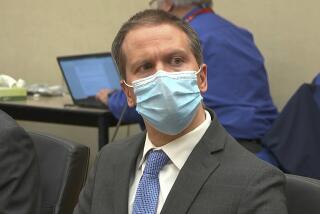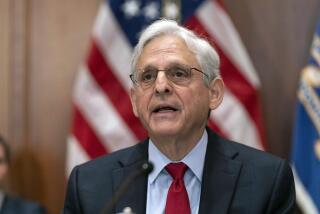Letters to the Editor: America has a long way to go to normalize police accountability

- Share via
To the editor: It’s fantasy to believe Derek Chauvin’s conviction will mean that police officers being held accountable will become normal. (“Chauvin’s conviction is not our exoneration,” editorial, April 20)
For example, researchers at Bowling Green State University found that between 2005 and 2018, only 97 nonfederal law enforcement officers were charged with murder or manslaughter, and 35 were convicted for an on-duty shooting. According to the Washington Post’s database on police shootings, officers kill about 1,000 people in the United States every year.
Have we forgotten that just 30 years ago, four Los Angeles Police Department officers bludgeoned Rodney King until they were exhausted? The beating was videotaped, but a Simi Valley jury acquitted the officers. Six years ago, in South Carolina, Officer Michael Slager shot and killed a fleeing Walter Scott. The killing was videotaped, and still the state trial resulted in a hung jury.
As the Rev. Martin Luther King Jr. said, change comes from “the tireless exertions and passionate concern of dedicated individuals.”
Marc D. Greenwood, Camp Hill, Ala.
..
To the editor: I’m glad former Minneapolis officer Derek Chauvin was convicted of murder, unlike so many other incidents where police have been able to walk away unscathed. But I think the real issue is that George Floyd might still be alive if police leaders did their job and enforced their own ethics and rules.
Most officers are good, hardworking people. Unfortunately, they all bear the negative shadow cast by a few.
Problem officers tend to be known to their colleagues and supervisors, but nothing is done about them. Police unions and department leaders protect and cover for them instead of stopping their behavior or dismissing them.
Chauvin had numerous complaints of excessive force on his record before he killed Floyd. Like any negative behavior, the more times you get away with it, the easier it is to do again.
Police departments need to enforce their own rules and get rid of noncompliant officers.
Christin Rubesh, Port Hueneme
..
To the editor: As I watched how people around the country reacted to the Chauvin verdict, I was struck by a poignant comment made by a young woman. When asked how she felt, she said, “I can breathe.”
Her three simple words captured so much of where we are as a society today.
“I can breathe” speaks to white privilege, never having to think you might ever not be able to take a breath.
“I can breathe” speaks to relief from the anticipation that another police officer would not be held accountable.
“I can breathe” speaks to the hope this verdict may signify positive change for the future.
“I can breathe” speaks to the fight that still lies ahead.
Catherine Perez, San Diego
..
To the editor: Why is it so hard to acknowledge that this verdict makes a huge statement that Black lives truly matter? And that it will make policing better?
Of course, one guilty verdict in Minnesota will not eliminate systemic racism in policing. But when have we seen officers and the chief himself testify against a fellow cop, breaking the blue line code of silence? That’s progress.
You can bet officers everywhere will be thinking of Chauvin’s fate when in similar situations. That’s progress.
This case is also fueling efforts in Congress and in statehouses to reform policing. That’s progress.
There is a reason Dr. King’s description of the moral universe was not a straight line — it was an arc, and it was long. It takes a lot of events to bend the arc toward justice, and this verdict is undoubtedly one of those events.
Eric Maman, Beverly Hills
..
To the editor: Should all people, especially people of color, wear body cameras? Would that prevent unnecessary police killings? Would that push police attitudes toward humanitarianism?
Robert Sidansky, Thousand Oaks
More to Read
A cure for the common opinion
Get thought-provoking perspectives with our weekly newsletter.
You may occasionally receive promotional content from the Los Angeles Times.









